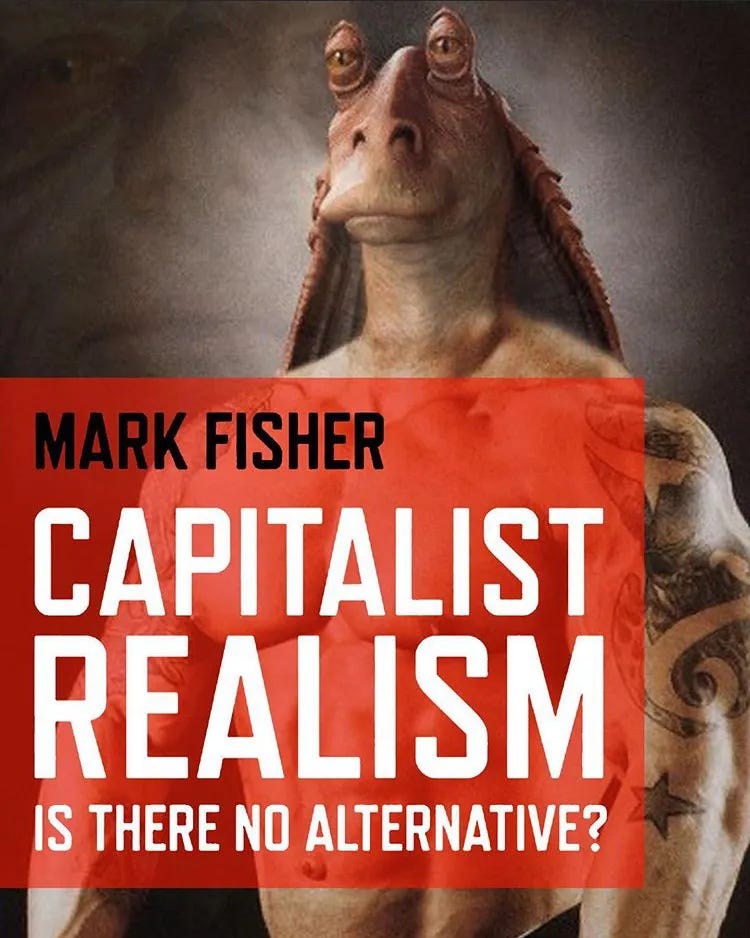audio version of the post
Even if you’ve never heard of Capitalist Realism by Mark Fisher, you’ve consumed content from people who read it. As Brian Eno said about the Velvet Underground: that group’s first album only sold 10,000 copies, but everyone who bought that album started a band. Everyone who read Capitalist Realism started posting think pieces.
In the early 2000s, Mark Fisher was a teacher at a further education school in the UK and also a blogger writing under the name k-punk. He was an early influencer before social media platforms took off — and his online writing as k-punk has the know-it-all shrillness and candor that has since become the characteristic tone of political people online. As k-punk, Fisher is always arguing, always oversharing, and always speaking from a place of exhausted, ironic moralism. Capitalist Realism really appears to have begun as a long rant about his job and the bullshit he has to deal with, and got extrapolated from that into a broader critique of late capitalism and the culture that perpetuates it.
Fisher has since become a terminally online favorite. I learned about him, as most did, around 2019 when Capitalist Realism memes came into vogue. Joshua Citarella describes the process of manufacturing the Capitalist Realism meme movement in his essay How To Plant A Meme.
Capitalist Realism’s main thesis lies in its title, which is Fisher’s term for the current (he’s writing in 2009) state of affairs. After the “end of history” and the “triumph of liberal democracy” following the fall of the USSR, 2009 is an era where it feels “there is no alternative” to the status quo. Grand ideologies, religions, and revolutions seem impossible. Capitalism has determined what we take to be “real,” making it so practicing “realism” no longer means representing what you actually experience or see with your own senses, but repeating the narratives that surround you.
Much of the book seems to be about hating Tony Blair and Bill Clinton’s “Third Way” politics of the 1990s, and for Fisher, what allowed this form of essentially irrational politics to take hold were the conditions of capitalist realism. The capitalist realist cultural vibe made an objectively insane way of running the world feel not just correct (that would be too flimsy) but natural. The system did better than persuade people, it engulfed them.
The overall meat of Fisher’s argument comes from Fredric Jameson and maybe a little from Slavoj Zizek, both of whom he cites. But what I love about Capitalist Realism is the way it pulls these thoughts out of the dense swamp of Theory and roots them in real life. Fisher’s analysis is always grounded in pop culture and personal narrative. That grounding isn’t just a gesture to make his thinking more “accessible” — it’s the heart of his thinking. Fisher comes at his ideas by watching movies and observing life first, then reading Marx.
I am wary of blaming everything on “capitalism” or of putting all the different kinds of capitalist systems into one bucket. One of the conflicts which Fredric Jameson (rest in peace) pointed out is that creating big theories to understand large spans of history ends up obscuring history as much as illuminating it, since you start to read events by that theory. I am also not a communist, because I love America. But Fisher is right about capitalism, and so is Marx.
The historical narrative which Fisher (and, by extension, Jameson) chart is a Marxian one, which sees the 20th century “Fordist model” of capitalism based on disciplining workers, centralizing authority, and tightly controlling society replaced by a “post-Fordist model” that relies on distracting everyone with bread and circuses while perpetuating a state of constant precarity and paranoia. This is what Jameson calls the “third phase” of capitalism and what others have called neoliberalism or late capitalism.
By neutering art, religion, and culture, capitalism created a kind of human subject that never existed before. By swapping tight, centralized control over restricted pieces of lived reality (keeping you at the factory for the whole workday, as in the Fordist model) for a looser, ever-present grip on each facet of experience, capitalism managed to survive the twentieth century in the post-industrial West. Instead of keeping people chained, modern capitalism has simply made the whole world a cell, giving them nowhere to run.
Our phones, which plug us immediately and seamlessly into the market in every idle moment, are one of the objects which exemplify this infiltration of capitalism into reality. Through the phone our art, intimacies, and all of our lives are chained to the market. Fisher calls it an “entertainment matrix.” In 2009, the smartphone is not really there yet, but Fisher’s hilariousy grouchy rant about the earbuds of a kid in his class mirrors everything people say about phones today:
I challenged one student about why he always wore headphones in class. He replied that it didn't matter, because he wasn't actually playing any music. In another lesson, he was playing music at very low volume through the headphones, without wearing them. When I asked him to switch it off, he replied that even he couldn't hear it. Why wear the headphones without playing music or play music without wearing the headphones? Because the presence of the phones on the ears or the knowledge that the music is playing (even if he couldn't hear it) was a reassurance that the matrix was still there, within reach. Besides, in a classic example of interpassivity, if the music was still playing, even if he couldn't hear it, then the player could still enjoy it on his behalf. The use of headphones is significant here - pop is experienced not as something which could have impacts upon public space, but as a retreat into private 'Oedlpod' consumer bliss, a walling up against the social.
Lately, I’ve been unable to fall asleep unless there’s a podcast or an audiobook on. It started out wholesomely — I was listening to Mike Duncan’s Revolutions podcast, and enjoying it. But now I’ve listened through all of his stuff and feel this strange anxiety in silence that makes my heart beat faster. It’s as if I can’t not be engaged, because I don’t have any script in place to just be myself. To feel at ease, I must be able to say, “I’m listening to a podcast,” or “I’m working on this thing,” I have to be in the matrix. Simply being is something that feels, to me, the way I used to feel as a child about the dark.
Rationally, there is nothing to fear: the reassurances given by supervising adults and my own eyes are rock-solid. Hat Man is not there, and I know it. But what actually bugs me isn’t monsters, but the knowledge that no reassurance can ever entirely work. The frantic attempts of the market to cram life with color and content make my lack of confidence in the supervision of experts, in the studied answers to ambiguity, and in the meaning of anything strike sharper. The more the curated, manicured world created by companies and technology expands, the larger the space behind it becomes. No matter what way media maneuvers, emptiness catches up a moment later. The more they fill and explain life with pre-optimized answers, the less I am able to think or relate outside of their lines, and the scarier that territory on the other side of the customer service bot’s response becomes. They invent an app for whatever it is, and the space they haven’t solved gets darker.
Fisher describes a “hedonic depression” among his students, a desperate search for meaning and a socially-conditioned inability to find it. He is at his most compelling when he talks about mental health. He argues that we should “politicize” depression, anxiety, and other mental health issues instead of seeing them as “diseases” or problems of chemical imbalance. Some of this feels a little analytically sketchy — particularly the part where he blames advertising for dyslexia — but I think there’s something here which rings true. Almost everybody in my generation will say they are depressed or anxious. There’s something structural and systemic going on with that.
This is the thing which people will remember most about Fisher, who took his own life in 2017 after a lifelong battle with depression. He manages to see within everyday, personal experience the marks of a collective problem. His way of thinking validates the reality of what is within yourself over the reality of what is imposed by capitalism, society, or whatever it is that messes the earth up.
The intimate, specific, and shameful are crucial parts of us worth analyzing and reclaiming. When you think of oppression, don’t just think of factory smokestacks or tanks rolling down the road — think of 2 AM and still on your phone, think of your friends who aren’t doing well and the plans you aren’t confident enough in the future to make. What happens on the inside of people, in their hearts and minds, is the foundation on which all other bad stuff is built.
Much like a good critique of Marxism would take into account Jameson’s warning about large theories that limit as much as they illuminate, a good critique of capitalism should see the categories we define contemporary experience by as tools not just for clarification but for obfuscation. Discourses like “mental health” and “liberal or conservative” nudge us to see a person or a problem from one particular angle before we try and see it from another. They place ambiguity and pain within little boxes and say the people in charge can seal those boxes up and file them away. The current discourses are all self-justifying, and they feel desperate. Institutions — whether universities, governments, media companies, whatever — are desperately trying to reassert their vanishing ability to set the bounds of what people can treat as real.
For this reason, Capitalist Realism is now a dated book. The institutions that want to think they’re in charge are simply not in charge anymore. For better and worse, the bounds of what people see as “real” have expanded since 2009. We are again living among angels and aliens, mingling with AIs and wrestling with demons. You can no longer insure a home in the state of Florida and everyone is buying guns and survival rations. Floodwater and wars prove the irrationality and intellectual hollowness of what once felt normal. From an objective standpoint, the guy who thinks the moon landing was faked is no crazier than the Democrat Senator who believes we can do a gradual transition away from fossil fuels. It’s just that one of them can talk on TV and the other one has to talk on YouTube.
So, there’s the enduring value of Mark Fisher. Here’s the pdf of the book.









Really nicely written